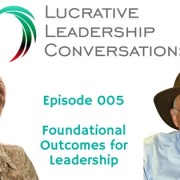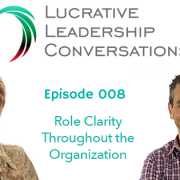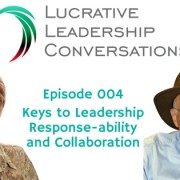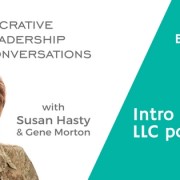006 | Creating Leadership Accountability for Your Business
Do a quick search for “business failure” and in less than half a second, Google will return more than 10 million results. You read that right. Ten million. Failure in business is a major concern. Putting in the hard work of creating and sustaining leadership accountability is a priority every company must achieve to survive.
Why do so many organizations fail? According to Gene Morton and his Leaders First process, it is because leaders: 1) Do not set critical outcomes for the organization, and 2) Do not communicate who is accountable and give the power to ensure the outcome is delivered.
In our last episode of the Lucrative Leadership Conversations podcast, we discussed critical outcomes and how they benefit the organization. Outcomes provide focus and clarity for an organization. They allow leaders to zero in on what needs to happen each and every day.
Once outcomes are determined, the question is: How are we going to deliver these outcomes each day, and how do leaders lead together? How can they communicate and organize themselves to be efficient and effective in those deliveries? The answer is leadership accountability.
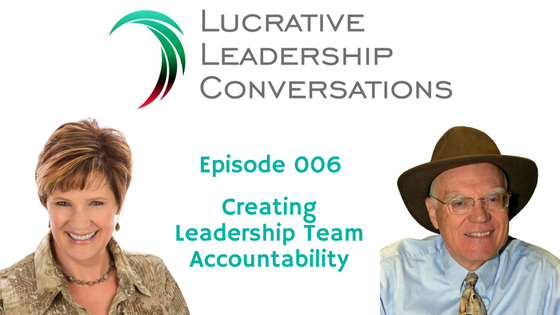
The Critical Need for Leadership Accountability
We need someone who WILLINGLY accepts accountability AND is granted the power and support of the entire leadership team. This is WHY we believe ACCOUNTABILITY should be NEGOTIATED Upfront.
Creating clear accountabilities and agreeing on decision rights is crucial to successful execution. WHY? Because it’s KEY to aligning clarity and focus which enables commitment.
Reflect on the opportunity costs of unmet commitments. Some executives have said that only 50% of the commitments made in their organizations are followed through to completion. Hopefully, that’s your competition. It’s shocking and a clear sign of a dysfunctional culture. It’s the canary in a mine with deadly gas.
When leaders don’t have a structure aligned with the company goals and vision, commitment is impossible.
Rework, disappointment, aggravation and the resulting lack of trust sappes time, energy and money from the bottom line and opportunities for growth. More deadly is burn out; the impact when good employees and good leaders leave, which inevitably, they will.
The ripple effect…
The habit of not keeping promises becomes the norm; accepted and part of the culture. The impact on customers, the reputation and the increased risk drains the oxygen organizations need to survive.
Commitment is foundational to sustainability. When a company has it, there’s no obstacle, risk or challenge they can’t overcome..together. Clarity and focus builds commitment through clearly defined accountabilities.
So, in this episode, we “bring leadership accountability home”. “The outcome is the key to a company’s survival. When leaders accept accountability for an outcome, that outcome becomes their ‘home base.’ They become the person with power of authority over the success of the outcome.” – Gene Morton
Here’s a Breakdown of Today’s Episode:
- What the term “leadership accountability” really means for an organization (Hint: accountability is more than being a “scapegoat” when mistakes are made!)
- How clearly defining outcomes provides the ability for your leadership team to focus their attention on the outcome while providing clarity about what your organization is about and what everyone should be doing, every day, for your company to survive.
- Why it is important that team leaders communicate with each other on who is accountable for a specific outcome.
- When leadership accountability is negotiated, it can significantly impact the company’s managing capacity.
- Gene shares his views on what a leadership team is accountable for as a whole.
- Gene shares his views on what the CEO of an organization is responsible and accountable for.
3 Questions to Ask Yourself if No One “Steps Up” to Accept Accountability:
- Is the outcome relevant?
- Is the outcome worded clearly and correctly?
- Are there any underlying tensions about this particular outcome within the organization that needs to be addressed?
Today’s Takeaway:
- It is important to ask “Who can we count on to see this decision through to a successful completion?” and “Whose support will be needed for this outcome to be successful?”
- Any person that is in a position or conversation to make decisions should ask who is willing to accept the accountability for the execution and implementation of the decision.
Remember:
- Keep tuning the system
- Maintain integrity and champion the strategic vision
- Keep the feedback loop moving
Any individual person who is the conversation when decisions are made (comany, non-profit, etc.) needs to ask who is going to be willing to take responsibility– who can we count on to see this thing through to its successful completion. Secondly, whose support will be needed in order to help you be successful. This is the leadership accountability at its best.
Helpful Links & Resources:
About the Hosts:
SUSAN HASTY

Susan Hasty is the CEO of 360 Profit Masters and the host of the Lucrative Leadership Conversations podcast. Susan considers herself a “maverick leader” on a mission to inspire and equip leaders to ignite their leadership genius. Susan co-founded 7 business ventures over the last 35 years. Her passion is helping business owners and CEOs improve their own clarity, focus and commitment to build more sustainable organizations empowered to make economic liberty a reality. She is certified in Neurolinguistic Programming and is a Strategic HR Business Partner by the Human Capital Institute. She is a member of the Marshall Goldsmith Stakeholder Centered Coaching Network of International Leadership coaches.
Ready to your business more profitable? Schedule a free call with Susan Hasty
GENE MORTON
 Gene Morton is an organizational psychologist based out of Colorado. He is also an award winning author of the book, Leaders First: Six Bold Steps to Sustain Breakthroughs in Construction. Over the past 40 years, Gene has consulted on more than 100 projects in 85 organizations with leader groups engaged in complex mergers, reorganizations, leadership turnarounds, and system redesigns.
Gene Morton is an organizational psychologist based out of Colorado. He is also an award winning author of the book, Leaders First: Six Bold Steps to Sustain Breakthroughs in Construction. Over the past 40 years, Gene has consulted on more than 100 projects in 85 organizations with leader groups engaged in complex mergers, reorganizations, leadership turnarounds, and system redesigns.
He developed the Leaders First Alignment Process to provide leadership teams the model they need to gain clarity as the organization evolves. His passion is mastering the complexities of organized and collaborative leadership.
Connect With Us
Subscribe to itunes Subscribe to stitcher Subscribe to Google Play
Straight forward leadership advice
Learn a simpler, more practical approach to building your leadership team strength... Delivered straight to your inbox!

